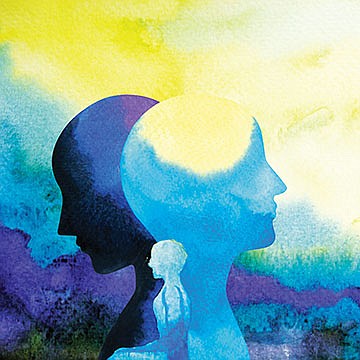Flipping through self-help books is a thing of the past. When it comes to cultivating good mental health habits, more people are trading the book store for the app store.
By one count, more than 1,400 mental health apps are now available. Many claim to help with depression, self-harm, substance use, anxiety and schizophrenia. Most specialize in guided meditations and mindfulness. Research into mindfulness has shown that body awareness, focused attention, self-perception and better physical health can help with anxiety, according to anxiety.org.
Here are some apps available for both Apple and Android that may help bring you peace and serenity:
Happify
Happify asks the user questions to recommend specific games and activities. It teaches skills to reduce stress, boost self-esteem and improve relationships. Happify does this by offering a variety of tracks to focus on: mindfulness, health, interpersonal and personal growth, and work.
The app and web-based version of Happify both host discussion forums, typically answering questions the app prompts, such as "Today's grateful moment?" or "What are you proud of?"
Happify data indicates that over a two-month period of using the app three to four times a week, 86% of users report a happiness boost.
Smiling Mind
Audio-based meditation app Smiling Mind provides a range of applications - everything from workplace mindfulness to programs for children.
Smiling Mind is an Australian nonprofit developed with psychologists and health professionals with over 1 million users, according to the app.
Before the sessions start, users are asked to rate their happiness and alertness. Then, the meditations begin. Programs like "21 Night Sleep" or "Connecting with Nature" guide users through days-long modules to create habits.
The landing page for the app keeps track of the number of sessions and time spent meditating, letting users see their "streaks."
Mental health stats
* In the United States, one in five adults and one in six youth experience mental illness each year.* 43% of U.S. adults with mental illness received treatment in 2018.* Those with depression have a 40% higher risk of developing cardiovascular or metabolic diseases than those without.Source: National Alliance on Mental Illness
Sanvello
Previously known as Pacifica, Sanvello aims to break the cycle of negative thoughts through journaling, mood tracking and audio-led meditation.
Sanvello bills itself as "on-demand coaching" using cognitive behavioral therapy, and says it takes about six weeks to fully master the techniques. Users are encouraged to self-monitor behaviors like sleep and exercise, which research has shown to promote awareness and self-efficacy, the app says.
In a randomized study of 500 adults with mild to moderate anxiety and depression, use of the app was shown to decrease symptoms, the company claims. Still, the app recommends its use in conjunction with professional treatment, not as a substitute.
Aura
Aura calls itself a "personalized audio streaming platform for wellness and mindfulness." When opened, the app asks how the user is feeling and uses the answer to gauge how to personalize the experience. It also considers such factors as age and gender.
The app offers life coaching sessions, immersive classical music or sounds of nature, a place to journal, guided meditations and motivational stories to read.
Users can try Aura for a week for free. Afterwards, it costs $4.99/month or $59.99/year.
